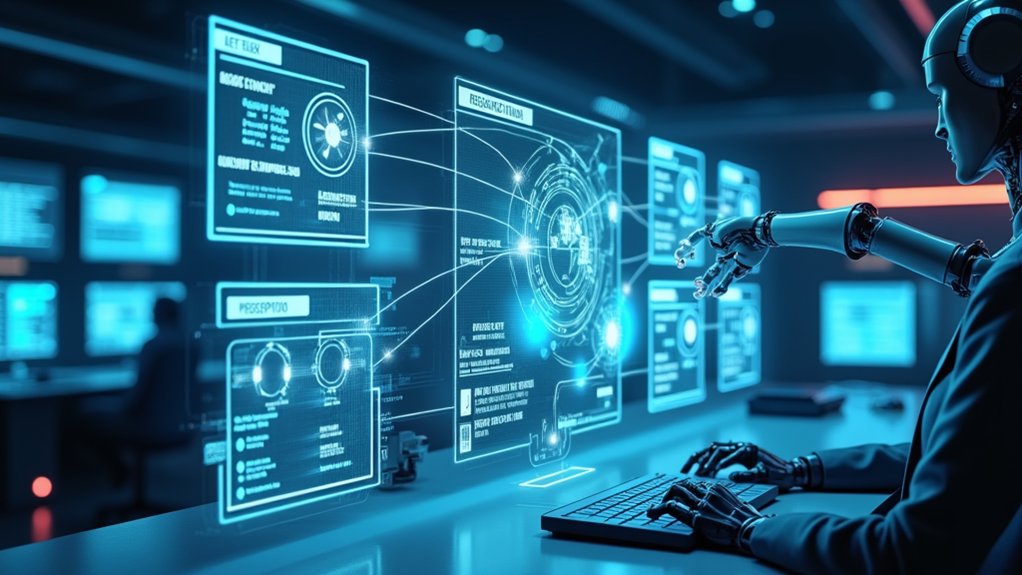What Are Artificial Intelligence Agents?
Artificial intelligence agents are sophisticated software programs that execute self-determined tasks through continuous environment interaction. These autonomous systems operate via perception-action loops, processing information using internal algorithms to inform rational decisions. AI agents range from simple reflex-based systems to complex learning agents that adapt strategies through experience. They decompose complex tasks into manageable components while integrating external tools and generative capabilities. Applications span customer service, transportation, personal assistance, and healthcare—with ongoing developments addressing coordination challenges in multi-agent frameworks.

Artificial intelligence agents operate like sophisticated software programs designed to execute self-determined tasks while pursuing predefined objectives through continuous environmental interaction. These agents follow a perception-action loop, gathering data from their surroundings, processing this information through internal algorithms, and executing responses appropriate to their programming parameters.
The field recognizes five primary agent types, each with increasing complexity: simple reflex agents respond directly to current perceptions without memory; model-based reflex agents maintain internal representations to handle incomplete information; goal-based agents actively prioritize outcomes; utility-based agents enhance decisions according to defined metrics; and learning agents adapt strategies through experience.
The operational framework of AI agents centers on rational decision-making principles, where suitable actions emerge from systematic data assessment. Agents decompose complex assignments into manageable sub-tasks and frequently integrate external tools like APIs or databases to compensate for knowledge limitations. These intelligent systems often incorporate generative AI capabilities to enhance their problem-solving abilities across industries.
Multi-agent systems deploy specialized entities working collaboratively, enabling sophisticated problem-solving through coordinated efforts. Self-correction mechanisms allow agents to reassess plans iteratively, reducing error rates through continuous feedback loops.
Real-world applications span numerous sectors, including customer service systems resolving queries autonomously, transportation networks managing self-driving vehicles, personal assistants organizing daily schedules, recommendation engines curating personalized content, and healthcare monitors tracking patient essential signs. Modern AI agents also benefit from implementing feedback mechanisms that improve accuracy and performance through user interactions.
These practical implementations demonstrate varying levels of autonomy, ranging from rule-based systems with limited flexibility to adaptive learning models capable of evolving responses. Businesses leverage AI agents to implement predictive analytics for supply chain optimization and customer behavior forecasting, turning raw data into actionable insights.
Despite their capabilities, AI agents face significant limitations. Their decision flexibility requires balancing rigid programming constraints with contextual adaptability. Learning agents demand extensive data for effective model adaptation, while complex multi-agent frameworks often struggle with coordination challenges and resource allocation conflicts.
Industry trends indicate growing emphasis on collaborative multi-agent systems with complementary specializations, potentially transforming operational workflows across sectors through enhanced task distribution and execution efficiency.
Frequently Asked Questions
How Do AI Agents Differ From Traditional Software Programs?
AI agents differ from traditional software programs through autonomous decision-making capabilities, employing dynamic goal-based planning rather than predefined rules.
Unlike static programs requiring manual updates, AI agents learn adaptively from interactions and real-time data. They demonstrate context awareness by engaging in multi-turn conversations and personalizing responses based on user preferences.
Traditional software follows linear workflows with fixed responses, while AI agents excel in unpredictable environments by self-adapting to novel challenges without explicit reprogramming.
What Ethical Concerns Arise From Deploying Autonomous AI Agents?
Deploying autonomous AI agents raises several critical ethical concerns.
These include transparency issues in decision-making processes, potential perpetuation of biases from training data, challenges in accountability when systems cause harm, risks to data privacy and security, and unintended societal consequences.
Additionally, workforce displacement, the possible amplification of misinformation, and value alignment difficulties between agent behavior and human norms present significant ethical challenges that require robust governance frameworks and continuous oversight mechanisms.
Can AI Agents Develop Their Own Goals Without Human Input?
Current AI agents cannot develop their own goals without human input. They operate within parameters explicitly defined during development, with autonomy limited to tactical execution rather than objective creation.
While agents can decompose tasks and optimize strategies to achieve programmed goals, they lack inherent motivation for establishing new objectives. Their decision-making remains bound to original constraints, focused on target alignment rather than spontaneous goal generation or value development beyond human specification.
How Do AI Agents Handle Unpredictable Real-World Scenarios?
AI agents handle unpredictable real-world scenarios through multiple architectural approaches: combining utility-based decision-making with real-time reflexes, employing adaptive reasoning strategies for dynamic situations, implementing continuous learning mechanisms for self-improvement, and integrating diverse data sources contextually.
These systems use corrective learning to test hypotheses against historical data, probabilistic models to predict risks, and feedback loops to refine responses based on outcomes, enabling them to navigate complex environments despite intrinsic uncertainty.
What Skills Will Remain Uniquely Human Despite Advanced AI Agents?
Despite rapid AI advancement, uniquely human skills remain firmly entrenched in domains requiring emotional intelligence, contextual ethics, and intuitive creativity.
Humans excel in making value-based judgments that balance quantitative and qualitative factors, forming authentic interpersonal connections founded on shared experiential understanding, and generating groundbreaking innovations through cross-disciplinary thinking.
Additionally, humans possess inherent motivation derived from personal meaning-making processes that AI cannot replicate without predetermined programming parameters.